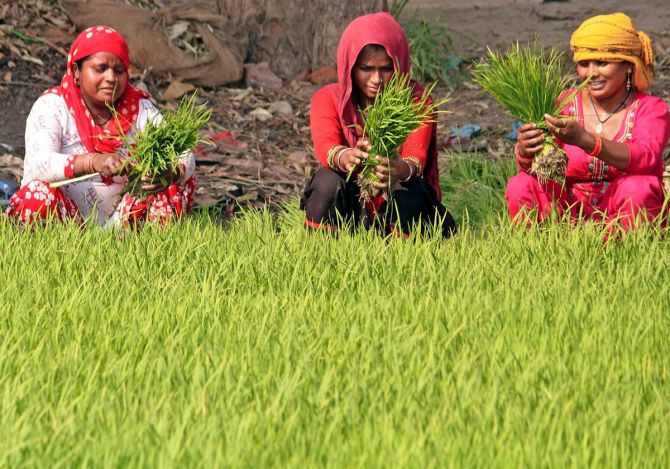
The Centre on July 20 banned the export of non-basmati white rice with immediate effect to boost domestic supply and help control inflation.
Non-basmati white rice accounts for nearly 25-30 per cent of total rice exported from the country.
The total exports of non-basmati white rice from India was $4.2 million in 2022-2023, as against $2.62 million in the preceding year.
Major destinations of India's non-basmati white rice exports include Thailand, Italy, Spain, Sri Lanka and the USA.
Volume wise, India exported 6.5 million tonnes of this variety in FY23, compared to 5.3 million tonnes in the previous financial year (a rise of nearly 22 per cent).
The ban comes at a time when rice prices as per an official statement have increased by over 11.5 per cent over a year and three per cent in the past month.
Concerns over rice production in the kharif season due to inadequate rainfall in the major growing states of Bihar (-40 percent cumulative deficit), Jharkhand (-44 per cent deficit), Odisha (-15 per cent deficit) and excess rains in other major states like Punjab (+52 per cent) and Haryana (+65 per cent), have played a part in the government's decision.
Till last fortnight, paddy had been planted in around 10.32 million hectares, which is almost 9.8 per cent less than the area covered during the same period of last year.
Rice stocks in the central pool as on July 1 is estimated to be around 48.65 million tonnes (this also includes unmilled paddy lying with the millers), almost 13 per cent less than the same period last year.
Last year, the government imposed a duty of 20 per cent on all non-basmati rice exports to curb overseas shipments, but it has failed to curb the exports as international prices were high.
Official data showed that despite the duty, the export of non-basmati white rice (the one banned today) had increased to 4.21 million tonnes in September-March period of the 2022-23, from 3.36 million tonnes during the same period in the previous financial year.
In the first quarter of the current financial year, about 1.55 million tonnes of white non-basmati rice was exported, against only 1.15 million tonnes in the year-ago period, a surge by 35 per cent.
'This sharp increase in exports can be ascribed to high international prices due to the geopolitical scenario, El Nino sentiments and extreme climatic conditions in other rice producing countries,' an official statement said.'
It added that stopping these exports will lead to lowering of prices for the consumers in the country.
However, there is no change in export policy of non-basmati rice (parboiled rice) and basmati rice, which forms the bulk of rice exports, the statement added. Industry players have expressed dismay over the government's move.
"It is a huge blow to the industry which after so many hindrances had got a prominent position in the world rice markets. The decision has been taken due to rise in domestic prices and delayed sowing of paddy," said Rahul Chauhan, commodity analyst at iGrain India.
S Chandrasekaran, a leading trade policy analyst and author of the book Basmati Rice: The Natural History Geographical Indications, said Indian rice exports will not lose its market position as it is driven by price competitiveness.
He termed the decision as timely and inevitable in view of combating inflation and protecting food security.
Feature Presentation: Aslam Hunani/Rediff.com











